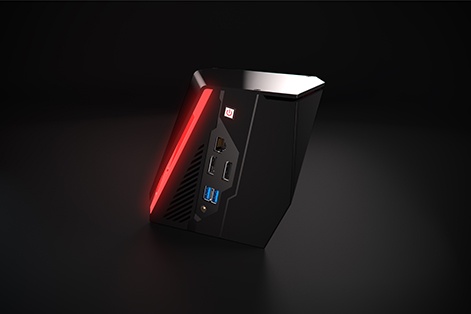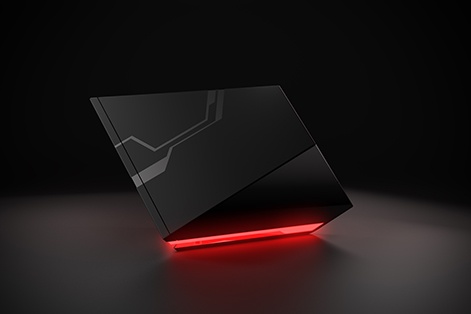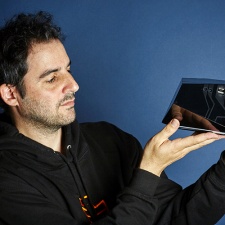We first met PC streaming company Shadow Blade at Gamescom 2017. In all honesty, we agreed to sit down with the French tech start-up because the product they were showing off - a streaming box that can be used in lieu of a high-end PC - sounded too good to be true. We were proven wrong when the firm showed off just what its tech could do, on the convention's terrible wi-fi, no less.
Now the product is out in the wild in France and the UK, with a US release coming up later this year. We caught up with CEO Emmanuel Freund to see what 2018 is looking like for the firm.
How have things been since we last saw each other at Gamescom?
Quite intense. We opened up everything in France in November. In one month the number of users rose by four times. We got like 10,000 clients in December, which is more than what HP or Dell or a real manufacturer is actually selling, without doing any communication. It was a lot of word of mouth and influencers, but we didn't start with real ads and stuff. We actually did start, but they didn't really work for us. Word of mouth works for our kind of product. When we launched, we decided to do something particular in France, which is to go from a very unique and weird product, something that people look at and say: 'Might be interesting, might be the future, maybe I should try that, but it's not for day-to-day life' to a mainstream product where gamers in France were actually asking themselves: 'I need to buy a new computer, should I spend €1,000 or should I try Shadow, which is €30 a month. Thanks to that, you have two groups - the people that really love Shadow, the users that will tell their friends; and the people who hate it and say they want a real computer. All in all, it's working quite well. We now have 20,000 users, most of them in France, something like 16,000 or 17,000.
We were selling a lot thanks to our influencers or by word of mouth, so we figured we'd try a massive ad campaign and that it'd work well. We had ads everywhere and actually we didn't get one sale from that. It brought almost nothing, even by spending a lot on that.
How has the UK launch compared to the French one?
We learnt a lot. Some things were doing super well and things that were doing super bad. Sales are going quite well, as is the community in France - that's due to the proximity we have, explaining the product, explaining what is going on, what it will do... making people get invested in the company. It's working super well in France.
What we aren't doing well is massive ad campaigns. We tried. We were selling a lot thanks to our influencers or by word of mouth, so we figured we'd try a massive ad campaign and that it'd work well. We had ads everywhere and actually we didn't get one sale from that. It brought almost nothing, even by spending a lot on that. The reason is that we didn't feel something for quite a while. We spent one year getting a very small set of people, pro hardcore gamers that were using the product and really living with the product and knew everything, so they could answer questions.
At some point, we started to grow very fast. We want to do the same thing in the UK. We were in the middle of one thousand things when we launched the UK and it was our main priority. We started to open up to it. The UK was the first step to the US. But we had no resource to launch in the UK. So we decided to take three guys who were between 24 and 27, and told them they had some budget and were in charge of the UK.
The only thing they have to do is make sure people know what our product was and go to see influencers, to see streamers, to see pro-gamers, to do parties and stuff. We will not succeed by telling everyone: 'Hey, we're a new product, we work, just buy it' because that's not how it works. If you start saying that, people know there are a lot of failures in the cloud gaming space, there's a lot of misunderstandings. The only way to make sure our marketing is working and that we can start a new company is to make sure that people are involved. Users know and like the product, so they can answer questions for other people. That's what we started with; we started with 500 users.

For those users, we'd give away the box, so they can have the real experience, use it, see and decide by themselves whether it's good or not. If it's good, they can claim that everywhere. We open three weeks ago and have already shifted those first 500 units. We have a Discord now, we are starting to have a community. The Discord has more than 1,000 members; that's after one month. People are super excited and that's really nice to hear and to see. People are saying in the Discord that Shadow is working great, that they've tested and tried it. And they are really willing to show that to everyone. You are actually using a computer that's not there; it's kind of magic the first time you use it. You want to tell your friends that it's working. We started with three very young guys that got some budget and were asked to start the community.
The high price of the GPUs is super important for us. It's no secret that it's painful because we are buying lots of GPUs. We have 20,000 GPUs right now and are buying a lot more.We are quite eager that the market starts to come to a reasonable ground.
How long until this goes mainstream? How long before I can walk into a Currys PC World in the UK and buy one of these?
In France, we are mainstream now. Fnac, LDAC, Amazon, everyone is asking us for Shadow. It makes sense and is helping a lot. Every time we do things like other people, we fail. We are not built to do that. We want to do things our own way. The things we are doing, we need to do with the community because that's working. One of the main brick and mortar PC retailers said that this won't replace the big PC tower. You'll always have players who want to spend €2,000 on a computer and build their own cooling system with red lights and stuff. They're looking for the last frame per second. Those guys will never go for Shadow, even if it's the same performance and everything. They have €2,000, they want to spend it. But people who play on the big gaming laptops that weighs five pounds and is making an awful noise as soon as you start the game up because there is a cooling system running - you can now start Shadow on that kind of PC and play Doom or Fortnite.
So this is for people who want to get involved in PC games, but don't want to lay out $1,000-plus?
Exactly. It's a big market. Anyone who doesn't love the big tower and loves computer gaming. Again, we don't want to be directly on Amazon or PC World on day one. We need the community, we need the country, we need the people to understand that it's coming and to try it. It's a young technology, it's working fine, we need to say 'Try it, it works'. After that, it's easy. The best sellers are our customers, really.
Do you see yourself as a solution to people who want to buy a gaming PC, but are maybe put off by the rising price of GPUs?
We benefit a lot from that right now. And like I said, sadly - or luckily - the reason people are buying Shadow is the price. It's the price people care about. People will use it, and more and more people will use it, based on what we've seen in France. Then they'll see the advantage of that. The high price of the GPUs is super important for us. It's no secret that it's painful because we are buying lots of GPUs. We have 20,000 GPUs right now and are buying a lot more.We are quite eager that the market starts to come to a reasonable ground.

What's the rest of 2018 looking like for Shadow Blade?
What we've told the press over the last six months is that we have an objective of 100,000 users by the end of 2018 in total. Actually, we plan to double or triple that, seeing the numbers we got from the first months of the year. The goal is to have hundreds of thousands of users. But what we are doing... the real thing we are doing is we have six months to a year technological advance on everyone else. We are the first one that can answer the question 'what does cloud computing actually enable in day-to-day life - how can it change the behaviours of people, how can we make it better?'. The real goal of the company is a bit different. Everybody's saying that Steve Jobs is a genius and that he's brilliant but there are very few people that wonder whether the smartphone is a progress or not. There's a lot of people that don't ask themselves if it makes people happier or not. Of course, it's useful, of course you can do a tonne of things with smart phones. But does it actually make humanity better? You don't know that. It's easy to develop technology. There are start-ups all over the place - you are looking for pain points and trying to solve it. If you do, you have a product that you can sell. By doing that, you are not asking yourself whether the product is useful or not. It'll remove the pain point, but in the end it might add a lot of things. When you create a new technology, even if it's really small or if it's super big, you need to ask yourself why you're doing that and what it will enable. That's the first question we need to ask ourselves. We are trying to improve gaming to enable new things and new usage. That's what we are doing. On that ground, you can imagine a lot of things. We have a big R&D department. For now we are saying it's as good as a computer, and you can access it everywhere and you don't have obselence. At the end you can do much better than a computer. You can have super fast games, you can have super fast software.













